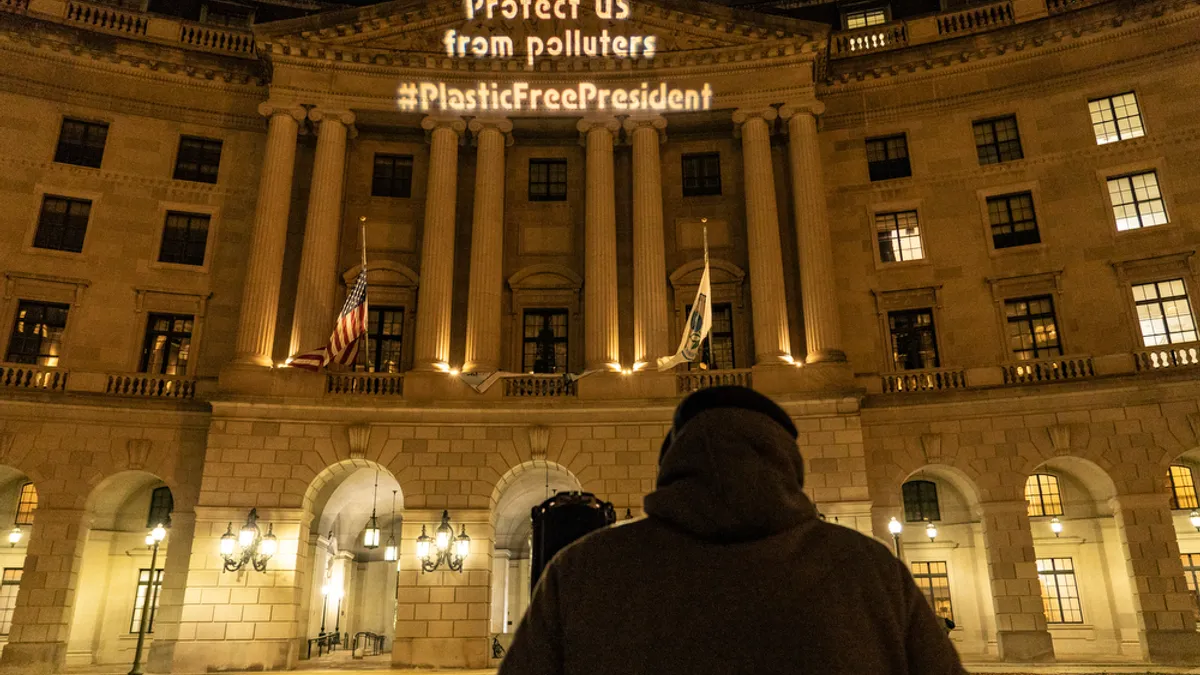Dive Brief:
- More than 550 community and environmental advocacy groups, led in part by the Center for Biological Diversity, are urging President-elect Joe Biden to take a series of actions in eight areas that could reduce plastics entering the waste stream, place new limitations on how they're managed and stimulate market demand.
- The Presidential Plastics Action Plan, released Tuesday, pitches creation of an office on Recycling Market Development and Waste Reduction Innovation within the U.S. Department of Commerce, among many items. It also proposes a moratorium on construction of new "garbage incinerators," along with sunsetting existing sites and closing ash landfills.
- The plan also calls on Biden to exercise "federal purchasing power" by putting an end to government buying of single-use plastic products and shifting toward reusable items. The group further recommended appointing a plastic pollution czar "to coordinate plastic reduction efforts amongst federal agencies and internationally."
Dive Insight:
Many of the groups involved in the wide-reaching plan supported the Break Free from Plastic Pollution Act introduced in February. Now, with a Democratic administration just over a month away from taking office, supporters see executive authority as a means to expedite action on curbing plastic pollution and addressing environmental justice issues.
“It is tough to get any bill through Congress and executive action can make a huge difference,” said Sen. Jeff Merkley (D-Ore.), a sponsor of the Break Free legislation that the plan asks Biden to support, during a press conference. Vice President-elect Kamala Harris was also a co-sponsor of the Senate bill that looks to phase out single-use plastics and implement new regulatory systems for recycling.
Beyond the push for that legislation, “there's untapped potential in the executive branch,” said Angela Howe, legal director at the Surfrider Foundation, in remarks on Tuesday.
The Break Free legislation is expected to have a hard time passing Congress without a Democratic majority in the Senate. Senate control may also be key for the Biden administration's ability to boost funding for plastic pollution initiatives, implement new treaties and ratify the Basel Convention, Center for Biological Diversity Senior Attorney Julie Teel Simmonds noted in emailed comments. "[W]e need action from both branches to successively tackle this pollution problem, but Biden can make some great strides on his own."
The plan includes multiple mentions of curtailing plastics production. The groups also ask Biden to veto any sections of spending bills backing chemical recycling, incineration or WTE and to place a moratorium on construction of new incinerators. The groups also want Biden to have states individually create plans for shutting down existing municipal incinerators and closing and remediating ash landfills.
David Biderman, CEO of the Solid Waste Association of North America, said in an emailed statement that WTE facilities in the U.S. "are an important component of EPA’s solid waste hierarchy, are stringently regulated, and it is not realistic to expect the Biden Administration and the states to shut down existing WTE facilities."
The American Chemistry Council, which voiced support for the U.S. EPA's new 2030 recycling goal and the recently passed Save Our Seas 2.0 Act, said in a statement: "Misguided policies that aim to eliminate all plastics overlook the myriad of benefits provided by the material on which Americans rely and would also increase negative environmental impacts."
In addition to market development plans for the Department of Commerce, other tasks laid out for Biden's agencies include the Federal Trade Commission prohibiting false recyclability claims on plastic products. As for EPA, groups want to see changes to the agency's Environmentally Preferable Purchasing Program. They also call on regulators to work with the National Institute of Standards and Technology to set minimum recycled content standards for beverage containers "and other items." California enacted a related standard in September, requiring plastic beverage containers be made from 15% recycled content by 2022, reaching 50% by 2030.
Under the groups' proposal, EPA would also be charged to "develop new data collection methodologies to accurately report waste reduction, recycling, and composting rates throughout the United States," with emphasis on consistent reporting from local and state governments and the private sector. Among multiple other proposals related to health effects, the agency is also asked to consider listing plastic as a hazardous waste under the Resource Conservation and Recovery Act.
The Biden transition team did not respond to a request for comment.
Additional reporting by Cole Rosengren















